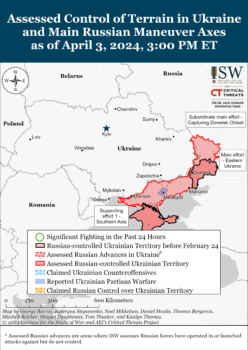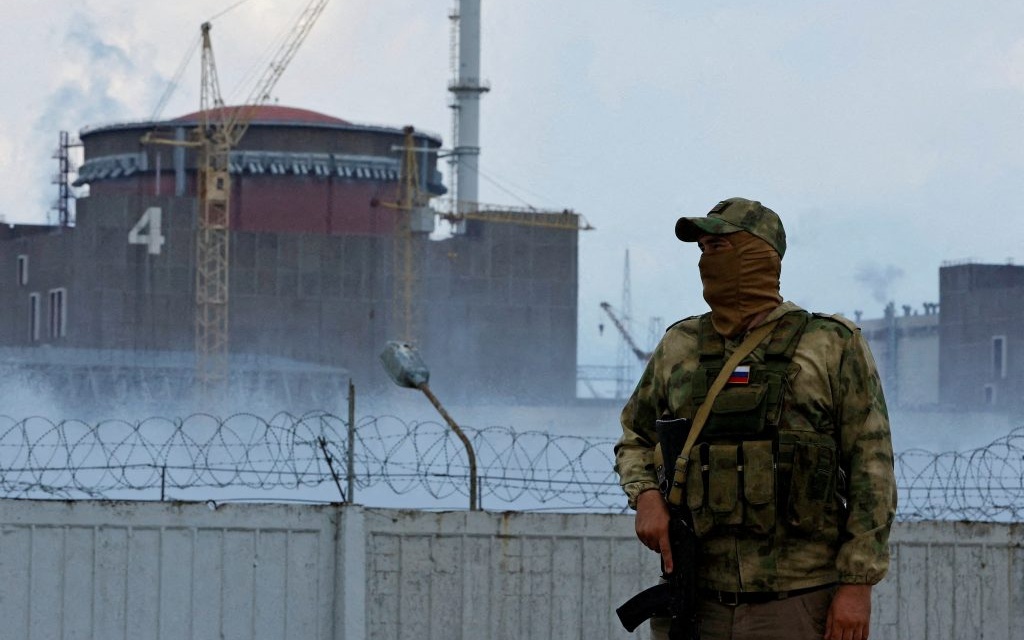A Russian soldier at the occupied Zaporizhzhia Nuclear Power Plant in southern Ukraine, August 4, 2022 (Alexander Ermochenko/Reuters)
Sunday’s Coverage: Zelenskiy — “We Might Run Out of Air Defense Missiles”

Map: Institute for the Study of War
UPDATE 1551 GMT:
Ukrainian Energy Minister German Galushchenko has spoken about Russia’s “largest attack on Ukraine’s energy sector” during Vladimir Putin’s 25 1/2-month invasion.
Galushchenko said of the assault since March, “Up to 80% of thermal generation was attacked. More than half of hydro generation and a large number of substations.”
He said that because Russia “has modified” its missile and Iran-type drones, “the scale and impact of these attacks is much greater” than Putin’s “energy war” from autumn 2022 until spring 2023.
The Energy Ministry said earlier on Monday (see 0742 GMT) that despite the intensity of the attacks, Ukraine’s energy system is almost completely stabilized.
UPDATE 1409 GMT:
Russia has continued its strikes on Zaporizhia city in southern Ukraine — close to the Russian-occupied Zaporizhzhia Nuclear Power Plant — hitting an industrial facility and injuring at least six people.
Last Friday, four people were killed in the city by attacks on another industrial facility and residential buildings.
UPDATE 1218 GMT:
Officials at the Russian-occupied Zaporizhzhia Nuclear Power Plant say another “kamikaze drone” has been shot down, falling on the roof of Reactor 6.
The officials did not identify the source of the drone.
UPDATE 0917 GMT:
Three civilians have been killed and three wounded in the latest Russian attacks on the Zaporizhzhia region in southern Ukraine.
UPDATE 0742 GMT:
Ukraine’s energy system is almost completely stabilized after Russia’s largest waves of missile and drone strikes, says Kyiv’s Energy Ministry.
The Russian attacks, notably on March 22 and 29, severely damaged infrastructure, including the Dnipro Hydroelectric Power Plant, the country’s largest. Ukraine’s electricity imports reached a record high at the end of March.
President Volodymyr Zelenskiy said on Sunday that he had discussed a series of Russian attacks on Kharkiv, Ukraine’s second-largest city, with the heads of the Security Service and Defense Intelligence and with the Interior Minister.
In his nightly address to the nation, Zelenskiy said:
It is quite obvious that our existing air defence capabilities in Ukraine are not sufficient and it is obvious to our partners. And the world must finally hear the pain that Russian terrorists are causing to Kharkiv.
The situation in Kharkiv is very harsh. Russian terror is constant. Russians began using guided aerial bombs against the city almost daily.
We are looking for ways to increase Kharkiv's ability to protect the sky. This is a task for both our military and diplomats, who are in… pic.twitter.com/UoQc9VEmTU
— Volodymyr Zelenskyy / Володимир Зеленський (@ZelenskyyUa) April 7, 2024
UPDATE 0637 GMT:
Kazakhstan banks have joined those of other countries in holding up transactions of Russian companies.
Nikolai Dunaev, vice president of the Russian business organization Opora Rossii, said pyaments transferred to Kazakhstan are being held up for weeks. He said dollar transactions had been affected for a long time, and problems began with transactions in national currencies from late February.
Echoing officials in other countries, he said financial institutions are trying to protect themselves from US-led secondary sanctions on any entity doing business with Russia.
Banks in China, Turkey, and the UAE are scrutinizing the accounts of Russian customers and suspending some of them. Russian oil firms are facing delays in several months in receipt of revenues.
Kazakhstan was formerly part of the Soviet Union and has maintained close relations with Moscow since gaining independence in December 1991. However, the Kazakh Government has distanced itself from support of Vladimir Putin’s invasion of Ukraine.
Alexander Linnikov, another Russian business official, confirmed that problems with Kazakh transactions began in January. He cited a delay of two to three weeks in processing.
Oleg Abelev of the Ricom-Trust Investment Company, blamed “unfriendly” countries for the extensive checking of Russian payments by Kazazh banks.
UPDATE 0626 GMT:
Ukraine air defenses downed 17 of 24 Iran-type drones and a Kh-59 guided missile launched by Russia overnight.
In the Odesa region in southern Ukraine, a logistics and transportation facility and a gasoline station were damaged.
ORIGINAL ENTRY: Drones have struck one of the six reactors at the Zaporizhzhia Nuclear Power Plant — Europe’s largest complex — in southern Ukraine.
But there has been no claim of responsibility as Ukraine and Russia’s invaders accuse each other of the attack on the Russian-occupied plant.
Rafael Grossi, the head of the International Atomic Energy, confirmed at least three direct hits against the main reactor containment structures. “This cannot happen,” he emphasized. “[The attacks] significantly increase the risk of a major nuclear accident.”
He noted that it was the first such attack on the complex since November 2022 — another incident where responsibility was not established — when the IAEA head set out five basic principles to avoid a serious nuclear accident with radiological consequences.
Russian officials at the plant declared that the drones were Ukrainian. But Kyiv’s intelligence agency countered, “Russian strikes, including imitation ones, on the territory of the Ukrainian nuclear power plant…have long been a well known criminal practice of the invaders.”
Serhii Lysak, the Ukrainian governor of the Dnipropetrovsk region said the Russian military had attacked the Nikopol area, across the Dnipro River from the nuclear plant, eight times since Sunday evening. A utility company was damaged.
A “Serious Incident”
Plant officials said there was no critical damage, with normal radiation levels in the complex. They added that there were no casualties, but Russia’s State nuclear agency Rosatom maintained that three people were wounded when a drone hit an area close to the site’s canteen.
The IAEA said in a statement that one casualty had been reported: “Damage at unit 6 has not compromised nuclear safety, but this is a serious incident with potential to undermine integrity of the reactor’s containment system.”
Russia seized the Zaporizhzhia NPP in early March 2022, days after the launch of its 25 1/2-month invasion. The occupying forces turned the plant into a military base, attacking Ukrainian-held territory across the Dnipro River.
Attacks in the area have recurrently damaged power lines to the site, threatening the cooling system for the six reactors. Five are in “cold shutdown”, while the sixth is in “hot shutdown”, providing heating and steam for nearby homes and businesses.
On March 22, Russia’s largest missile and drone strike this year — trying to cripple Ukraine’s energy infrastructure — threatened the Zaporizhzhia plant, cutting one of the two power lines. The line had just been repaired after Russian shelling the previous week.
Ukraine’s atomic energy operator Energoatom added, “This situation is extremely dangerous and risks sparking an emergency situation.”

